Module 5 The First Americans Grammar
文档属性
| 名称 | Module 5 The First Americans Grammar |

|
|
| 格式 | rar | ||
| 文件大小 | 57.2KB | ||
| 资源类型 | 教案 | ||
| 版本资源 | 外研版 | ||
| 科目 | 英语 | ||
| 更新时间 | 2009-08-06 00:00:00 | ||
图片预览

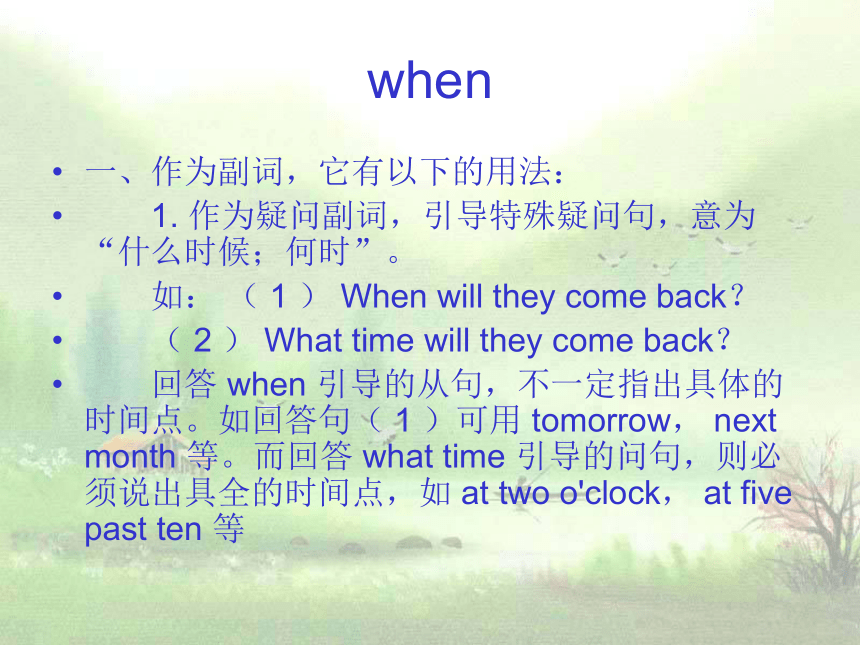

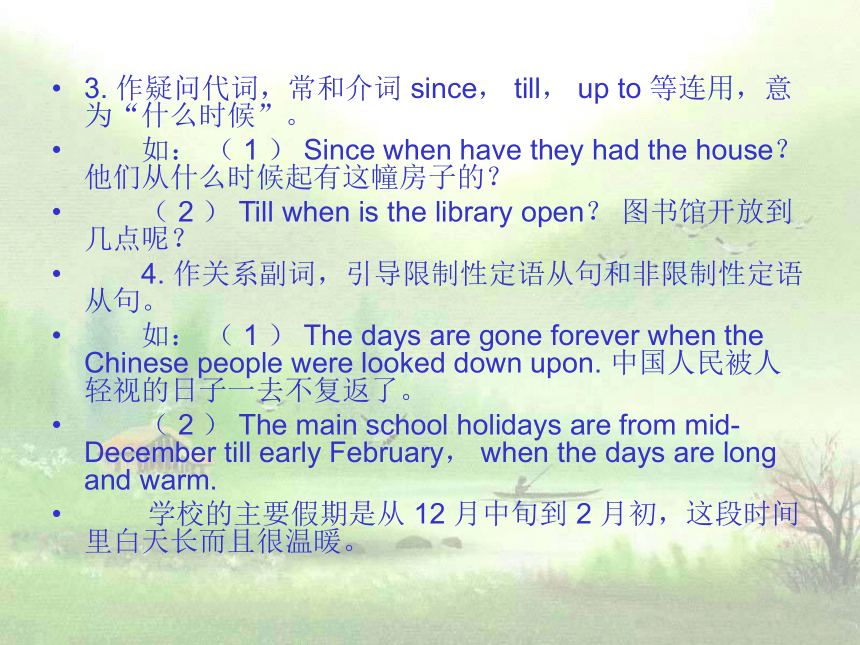
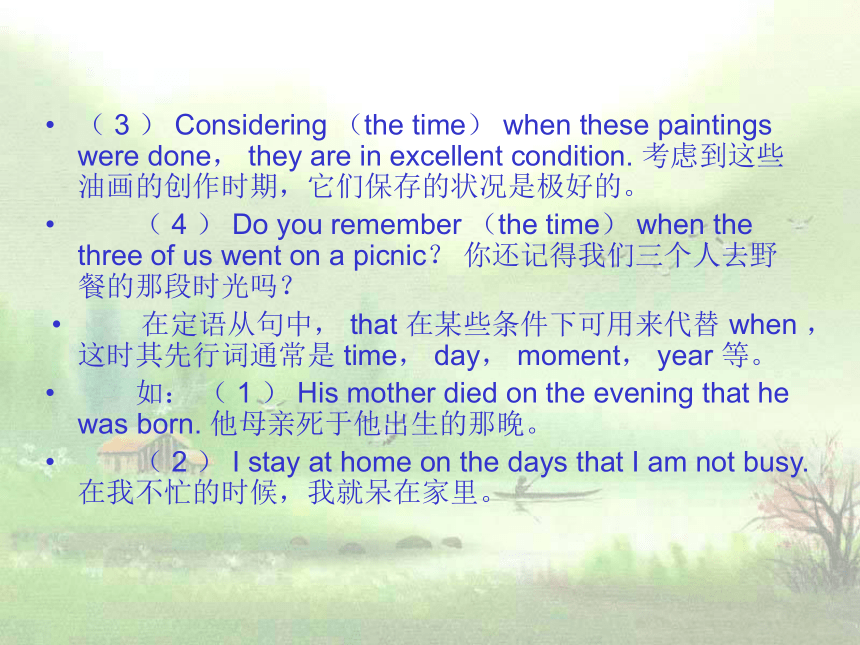

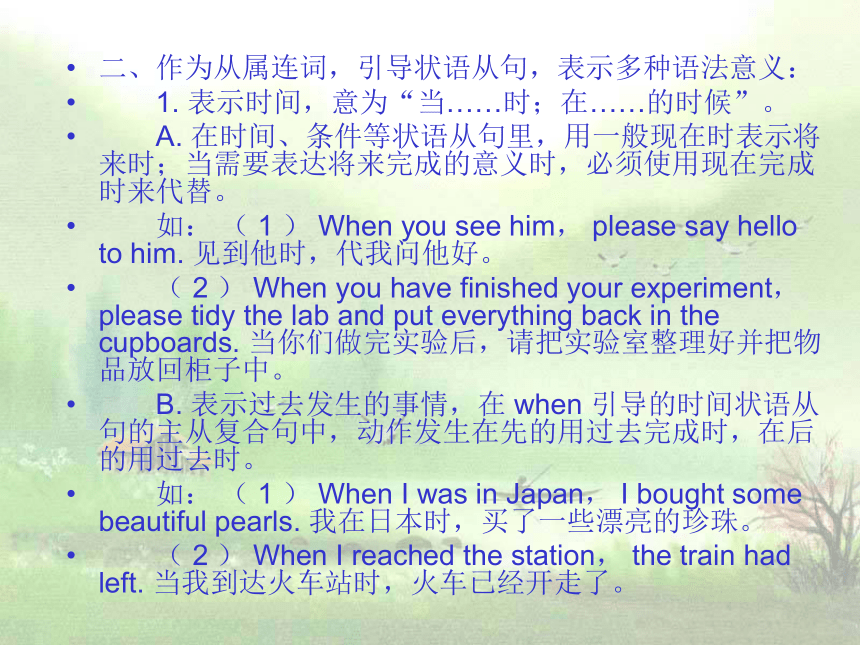
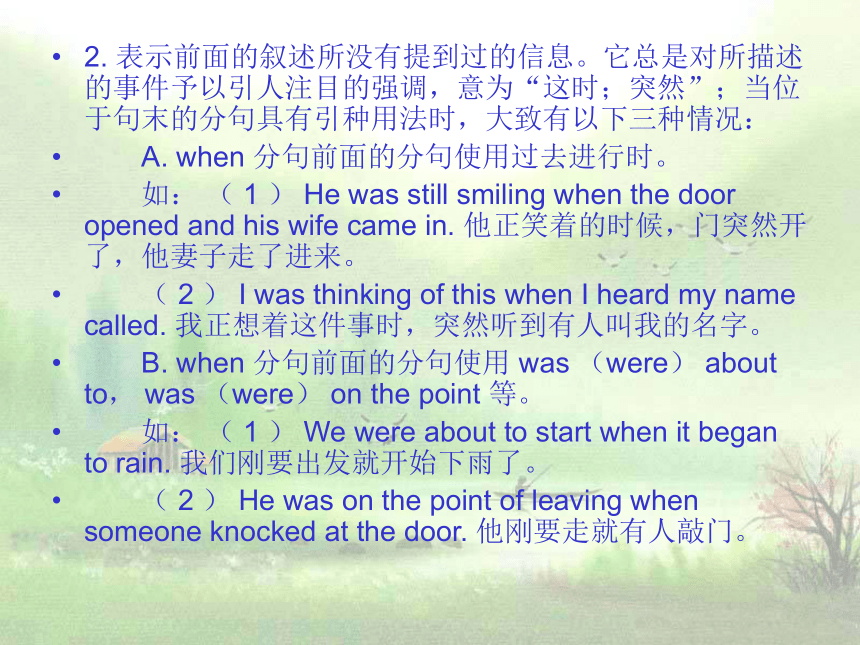
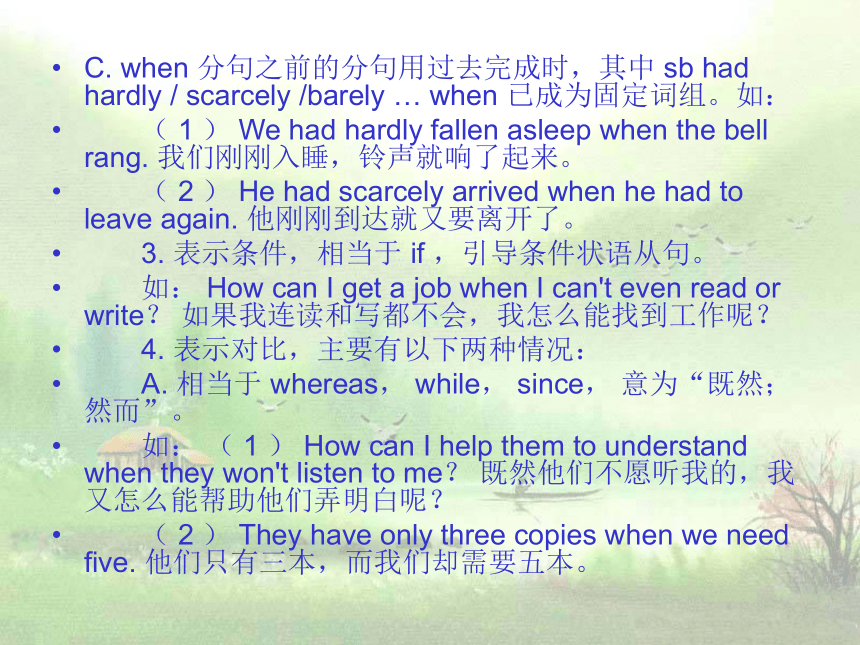
文档简介
课件23张PPT。Module 5
The first AmericansGrammarwhen一、作为副词,它有以下的用法:
1. 作为疑问副词,引导特殊疑问句,意为“什么时候;何时”。
如: ( 1 ) When will they come back?
( 2 ) What time will they come back?
回答 when 引导的从句,不一定指出具体的时间点。如回答句( 1 )可用 tomorrow, next month 等。而回答 what time 引导的问句,则必须说出具全的时间点,如 at two o'clock, at five past ten 等 2. 作连接副词,引导名词性从句或不定式,意为“什么时候”。从句使用陈述句语序,时态根据实际情况而定。
如: ( 1 ) I'd like to know when they will come. 我想知道他们什么时候来。( when 引导宾语从句)
( 2 ) Can you tell me when the bank opens? 你能告诉我银行什么时候开门吗?( when 引导宾语从句)
( 3 ) When she'll be back depends much on the weather. 她何时回来在很大程度上取决于天气。( when 引导主语从句)
( 4 ) Have you decided when to go sightseeing? 你们已经决定什么时候去郊游了吗?( when 引导不定式结构)3. 作疑问代词,常和介词 since, till, up to 等连用,意为“什么时候”。
如: ( 1 ) Since when have they had the house? 他们从什么时候起有这幢房子的?
( 2 ) Till when is the library open? 图书馆开放到几点呢?
4. 作关系副词,引导限制性定语从句和非限制性定语从句。
如: ( 1 ) The days are gone forever when the Chinese people were looked down upon. 中国人民被人轻视的日子一去不复返了。
( 2 ) The main school holidays are from mid-December till early February, when the days are long and warm.
学校的主要假期是从 12 月中旬到 2 月初,这段时间里白天长而且很温暖。( 3 ) Considering (the time) when these paintings were done, they are in excellent condition. 考虑到这些油画的创作时期,它们保存的状况是极好的。
( 4 ) Do you remember (the time) when the three of us went on a picnic? 你还记得我们三个人去野餐的那段时光吗?
在定语从句中, that 在某些条件下可用来代替 when ,这时其先行词通常是 time, day, moment, year 等。
如: ( 1 ) His mother died on the evening that he was born. 他母亲死于他出生的那晚。
( 2 ) I stay at home on the days that I am not busy. 在我不忙的时候,我就呆在家里。在某些含有“时间”的名词词组后面,由于该名词不表示时间,或整个名词词组已用作连词,所以不用 when 引导。如: the moment, the instant, the minute, the second 等等,意为“一……就……”,引导时间状语从句。
如: ( 1 ) The first time I went to China, I visited Beijing. 我第一次来中国就游览了北京。
( 2 ) I thought her nice and honest the first time I met her. 我第一次见到她时就认为她很诚实。
( 3 ) The instant I saw him I knew he was my brother. 我一看到他就知道他是我兄弟。二、作为从属连词,引导状语从句,表示多种语法意义:
1. 表示时间,意为“当……时;在……的时候”。
A. 在时间、条件等状语从句里,用一般现在时表示将来时;当需要表达将来完成的意义时,必须使用现在完成时来代替。
如: ( 1 ) When you see him, please say hello to him. 见到他时,代我问他好。
( 2 ) When you have finished your experiment, please tidy the lab and put everything back in the cupboards. 当你们做完实验后,请把实验室整理好并把物品放回柜子中。
B. 表示过去发生的事情,在 when 引导的时间状语从句的主从复合句中,动作发生在先的用过去完成时,在后的用过去时。
如: ( 1 ) When I was in Japan, I bought some beautiful pearls. 我在日本时,买了一些漂亮的珍珠。
( 2 ) When I reached the station, the train had left. 当我到达火车站时,火车已经开走了。2. 表示前面的叙述所没有提到过的信息。它总是对所描述的事件予以引人注目的强调,意为“这时;突然”;当位于句末的分句具有引种用法时,大致有以下三种情况:
A. when 分句前面的分句使用过去进行时。
如: ( 1 ) He was still smiling when the door opened and his wife came in. 他正笑着的时候,门突然开了,他妻子走了进来。
( 2 ) I was thinking of this when I heard my name called. 我正想着这件事时,突然听到有人叫我的名字。
B. when 分句前面的分句使用 was (were) about to, was (were) on the point 等。
如: ( 1 ) We were about to start when it began to rain. 我们刚要出发就开始下雨了。
( 2 ) He was on the point of leaving when someone knocked at the door. 他刚要走就有人敲门。C. when 分句之前的分句用过去完成时,其中 sb had hardly / scarcely /barely … when 已成为固定词组。如:
( 1 ) We had hardly fallen asleep when the bell rang. 我们刚刚入睡,铃声就响了起来。
( 2 ) He had scarcely arrived when he had to leave again. 他刚刚到达就又要离开了。
3. 表示条件,相当于 if ,引导条件状语从句。
如: How can I get a job when I can't even read or write? 如果我连读和写都不会,我怎么能找到工作呢?
4. 表示对比,主要有以下两种情况:
A. 相当于 whereas, while, since, 意为“既然;然而”。
如: ( 1 ) How can I help them to understand when they won't listen to me? 既然他们不愿听我的,我又怎么能帮助他们弄明白呢?
( 2 ) They have only three copies when we need five. 他们只有三本,而我们却需要五本。B. when 从句中使用虚拟语气,意为“本来……却……”。
如: ( 1 ) She paid when she could have entered free. 本来可以免费入场,而她却付了款。
( 2 ) She stopped trying when she might have succeeded next time. 她本来下次有可能获得成功,但她却不再尝试了。
( 3 ) They were gossiping, when they should have been working. 他们本该工作,却在那里说别人的闲话。
5. 由 when 等引导的状语从句,如果主语与主句的主语一致或是 it ,谓语动词又含 be 动词时,主语和 be 动词常常被省略,就变成“ when + V-ing/ V-ed/ adj/ 介词词组”的结构。
如: ( 1 ) When in Rome, do as Romans do. 入乡随俗。
( 2 ) When (we are ) young, we are full of hope. 年轻时,我们大家总是充满希望。
( 3 ) Don't reach sideways when standing on a ladder. 站在梯子上时,不要侧着身子去够东西。 And 1.连接两个数词,相当于plus,意为"加"。
如:What’s three and six?
2.and常用来连接两个并列的词。
A.连接名词。
如:There are two pencils and an eraser in the pencil-box.
注意:and连接两个词做主语时,谓语要用复数形式。如:Two apples and a pear are on the table. 当and连接两个相同的名词时表示反复、强调。如:We have books and books.我们有各种各样的书。
B.连接动词。
如:Come and meet my family.
注意,当and连接两个相同的动词时,表示动作的反复或强调。如:He looks and looks.他看了又看。
C.连接代词。
and在连接代词时通常把第一人称放在最后,这与汉语语序不同。如:you and I我和你,he and I我和他。
3.当and连接几个并列的词时,只在最后的词前加and,其他词用","隔开。如:Where are Hangzhou, Changsha and Siping? on一. 作介词: ?? ?1. 表示位置:在……上 ??? Lucy’s coat is on the desk . ??? We’re going to work on a farm . ??? There are many apples on the trees . ??? I have them on this piece of paper . ??? There was a big smile on her face . ??? Jim and Li Lei meet on the road outside Li Lei’s house . ??? Which channel is it on ? ?2. 表示时间:在……(天) ??? Everyone eats mooncakes on Mid-Autumn Day . ??? They arrived early on a Tuesday morning . ??? I eat mooncakes on that day . ??? I was born on February 18 , 1981 . ??? Either Tuesday or Wednesday is OK . I’ll be free on these days . 二. 作副词,与动词连用,构成短语: ?? ?1. come on跟我来,加油 ?? “Come on !”they shouted . ?? ?2. get on上(车) ??? Let’s get on the bus . ?? ?3. get on with(sb. )与(某人相处) ??? Usually we get on very well with each other . ?? ?4. go on继续 ??? Autumn starts in August , and goes on to October . ??? Go on until you reach the end . ?? ?5. hold on(for a moment)别挂断电话,等一等 come一、来到;来临。如:
Come to me,my boy.孩子,到我这儿来。
The old man came for a meeting.那老人来开会了。
二、开始。
如:He comes to know he is wrong.他开始认识到他错了。三、进入。
如:John came into the classroom.约翰进了教室。
四、用于一些固定搭配、成语、名言中。
如:Easy come easy go.来得容易去得快。
Winter comes,is spring far away?冬天来了,春天还会远吗?
Come on,or you'll fall behind.加油,不然你就落后了。
The girl came up with a question.那女孩提出了一个问题。
That story has come down from a long time ago.那个故事从很久以前就传下来了。can1. (表示能力、功能)能,会 The classroom can seat thirty students. 这教室能坐三十位学生。 June can drive now. 琼现在会开车了。 2. (表示可能性)可能,可能会 I think the work can be completed ahead of time. 我认为这项工作能提前完成。 3. (表示允许、请求)可以 You can't take the book out of the room. 你不可以将这本书拿出室外。 Can I use your pen? 我可以用一下你的笔吗? 4. (表示命令)必须 If you won't keep quiet you can get out. 你如不保持安静,就请你走。 5. (表示偶然发生的可能性)有时会 It can be quite windy there, especially in spring. 那里有时容易刮风,特别在春季。 6. (表示惊讶)究竟;竟至于 What can it possibly be? 到底那是怎么一回事? some和any的用法 (1)两者修饰可数单数名词时,表“某一个;任何一个”; 修饰可数复数名词和不可数名词时,表“一些;有些”。? (2)一般的用法:some用于肯定句;any用于疑问句,否定句或条件句。 I am looking for some matches. Do you have any matches? I do not have any matches.? 3)特殊的用法:? (A) 在期望对方肯定的回答时,问句也用some。 Will you lend me some money? (=Please lend me some money.)? (B) any表任何或任何一个时,也可用于肯定句。 Come any day you like.? (4)some和any后没有名词时,当做代名词, 此外两者也可做副词。 Some of them are my students.〔代名词) Is your mother any better?(副词)
1. 作为疑问副词,引导特殊疑问句,意为“什么时候;何时”。
如: ( 1 ) When will they come back?
( 2 ) What time will they come back?
回答 when 引导的从句,不一定指出具体的时间点。如回答句( 1 )可用 tomorrow, next month 等。而回答 what time 引导的问句,则必须说出具全的时间点,如 at two o'clock, at five past ten 等 2. 作连接副词,引导名词性从句或不定式,意为“什么时候”。从句使用陈述句语序,时态根据实际情况而定。
如: ( 1 ) I'd like to know when they will come. 我想知道他们什么时候来。( when 引导宾语从句)
( 2 ) Can you tell me when the bank opens? 你能告诉我银行什么时候开门吗?( when 引导宾语从句)
( 3 ) When she'll be back depends much on the weather. 她何时回来在很大程度上取决于天气。( when 引导主语从句)
( 4 ) Have you decided when to go sightseeing? 你们已经决定什么时候去郊游了吗?( when 引导不定式结构)3. 作疑问代词,常和介词 since, till, up to 等连用,意为“什么时候”。
如: ( 1 ) Since when have they had the house? 他们从什么时候起有这幢房子的?
( 2 ) Till when is the library open? 图书馆开放到几点呢?
4. 作关系副词,引导限制性定语从句和非限制性定语从句。
如: ( 1 ) The days are gone forever when the Chinese people were looked down upon. 中国人民被人轻视的日子一去不复返了。
( 2 ) The main school holidays are from mid-December till early February, when the days are long and warm.
学校的主要假期是从 12 月中旬到 2 月初,这段时间里白天长而且很温暖。( 3 ) Considering (the time) when these paintings were done, they are in excellent condition. 考虑到这些油画的创作时期,它们保存的状况是极好的。
( 4 ) Do you remember (the time) when the three of us went on a picnic? 你还记得我们三个人去野餐的那段时光吗?
在定语从句中, that 在某些条件下可用来代替 when ,这时其先行词通常是 time, day, moment, year 等。
如: ( 1 ) His mother died on the evening that he was born. 他母亲死于他出生的那晚。
( 2 ) I stay at home on the days that I am not busy. 在我不忙的时候,我就呆在家里。在某些含有“时间”的名词词组后面,由于该名词不表示时间,或整个名词词组已用作连词,所以不用 when 引导。如: the moment, the instant, the minute, the second 等等,意为“一……就……”,引导时间状语从句。
如: ( 1 ) The first time I went to China, I visited Beijing. 我第一次来中国就游览了北京。
( 2 ) I thought her nice and honest the first time I met her. 我第一次见到她时就认为她很诚实。
( 3 ) The instant I saw him I knew he was my brother. 我一看到他就知道他是我兄弟。二、作为从属连词,引导状语从句,表示多种语法意义:
1. 表示时间,意为“当……时;在……的时候”。
A. 在时间、条件等状语从句里,用一般现在时表示将来时;当需要表达将来完成的意义时,必须使用现在完成时来代替。
如: ( 1 ) When you see him, please say hello to him. 见到他时,代我问他好。
( 2 ) When you have finished your experiment, please tidy the lab and put everything back in the cupboards. 当你们做完实验后,请把实验室整理好并把物品放回柜子中。
B. 表示过去发生的事情,在 when 引导的时间状语从句的主从复合句中,动作发生在先的用过去完成时,在后的用过去时。
如: ( 1 ) When I was in Japan, I bought some beautiful pearls. 我在日本时,买了一些漂亮的珍珠。
( 2 ) When I reached the station, the train had left. 当我到达火车站时,火车已经开走了。2. 表示前面的叙述所没有提到过的信息。它总是对所描述的事件予以引人注目的强调,意为“这时;突然”;当位于句末的分句具有引种用法时,大致有以下三种情况:
A. when 分句前面的分句使用过去进行时。
如: ( 1 ) He was still smiling when the door opened and his wife came in. 他正笑着的时候,门突然开了,他妻子走了进来。
( 2 ) I was thinking of this when I heard my name called. 我正想着这件事时,突然听到有人叫我的名字。
B. when 分句前面的分句使用 was (were) about to, was (were) on the point 等。
如: ( 1 ) We were about to start when it began to rain. 我们刚要出发就开始下雨了。
( 2 ) He was on the point of leaving when someone knocked at the door. 他刚要走就有人敲门。C. when 分句之前的分句用过去完成时,其中 sb had hardly / scarcely /barely … when 已成为固定词组。如:
( 1 ) We had hardly fallen asleep when the bell rang. 我们刚刚入睡,铃声就响了起来。
( 2 ) He had scarcely arrived when he had to leave again. 他刚刚到达就又要离开了。
3. 表示条件,相当于 if ,引导条件状语从句。
如: How can I get a job when I can't even read or write? 如果我连读和写都不会,我怎么能找到工作呢?
4. 表示对比,主要有以下两种情况:
A. 相当于 whereas, while, since, 意为“既然;然而”。
如: ( 1 ) How can I help them to understand when they won't listen to me? 既然他们不愿听我的,我又怎么能帮助他们弄明白呢?
( 2 ) They have only three copies when we need five. 他们只有三本,而我们却需要五本。B. when 从句中使用虚拟语气,意为“本来……却……”。
如: ( 1 ) She paid when she could have entered free. 本来可以免费入场,而她却付了款。
( 2 ) She stopped trying when she might have succeeded next time. 她本来下次有可能获得成功,但她却不再尝试了。
( 3 ) They were gossiping, when they should have been working. 他们本该工作,却在那里说别人的闲话。
5. 由 when 等引导的状语从句,如果主语与主句的主语一致或是 it ,谓语动词又含 be 动词时,主语和 be 动词常常被省略,就变成“ when + V-ing/ V-ed/ adj/ 介词词组”的结构。
如: ( 1 ) When in Rome, do as Romans do. 入乡随俗。
( 2 ) When (we are ) young, we are full of hope. 年轻时,我们大家总是充满希望。
( 3 ) Don't reach sideways when standing on a ladder. 站在梯子上时,不要侧着身子去够东西。 And 1.连接两个数词,相当于plus,意为"加"。
如:What’s three and six?
2.and常用来连接两个并列的词。
A.连接名词。
如:There are two pencils and an eraser in the pencil-box.
注意:and连接两个词做主语时,谓语要用复数形式。如:Two apples and a pear are on the table. 当and连接两个相同的名词时表示反复、强调。如:We have books and books.我们有各种各样的书。
B.连接动词。
如:Come and meet my family.
注意,当and连接两个相同的动词时,表示动作的反复或强调。如:He looks and looks.他看了又看。
C.连接代词。
and在连接代词时通常把第一人称放在最后,这与汉语语序不同。如:you and I我和你,he and I我和他。
3.当and连接几个并列的词时,只在最后的词前加and,其他词用","隔开。如:Where are Hangzhou, Changsha and Siping? on一. 作介词: ?? ?1. 表示位置:在……上 ??? Lucy’s coat is on the desk . ??? We’re going to work on a farm . ??? There are many apples on the trees . ??? I have them on this piece of paper . ??? There was a big smile on her face . ??? Jim and Li Lei meet on the road outside Li Lei’s house . ??? Which channel is it on ? ?2. 表示时间:在……(天) ??? Everyone eats mooncakes on Mid-Autumn Day . ??? They arrived early on a Tuesday morning . ??? I eat mooncakes on that day . ??? I was born on February 18 , 1981 . ??? Either Tuesday or Wednesday is OK . I’ll be free on these days . 二. 作副词,与动词连用,构成短语: ?? ?1. come on跟我来,加油 ?? “Come on !”they shouted . ?? ?2. get on上(车) ??? Let’s get on the bus . ?? ?3. get on with(sb. )与(某人相处) ??? Usually we get on very well with each other . ?? ?4. go on继续 ??? Autumn starts in August , and goes on to October . ??? Go on until you reach the end . ?? ?5. hold on(for a moment)别挂断电话,等一等 come一、来到;来临。如:
Come to me,my boy.孩子,到我这儿来。
The old man came for a meeting.那老人来开会了。
二、开始。
如:He comes to know he is wrong.他开始认识到他错了。三、进入。
如:John came into the classroom.约翰进了教室。
四、用于一些固定搭配、成语、名言中。
如:Easy come easy go.来得容易去得快。
Winter comes,is spring far away?冬天来了,春天还会远吗?
Come on,or you'll fall behind.加油,不然你就落后了。
The girl came up with a question.那女孩提出了一个问题。
That story has come down from a long time ago.那个故事从很久以前就传下来了。can1. (表示能力、功能)能,会 The classroom can seat thirty students. 这教室能坐三十位学生。 June can drive now. 琼现在会开车了。 2. (表示可能性)可能,可能会 I think the work can be completed ahead of time. 我认为这项工作能提前完成。 3. (表示允许、请求)可以 You can't take the book out of the room. 你不可以将这本书拿出室外。 Can I use your pen? 我可以用一下你的笔吗? 4. (表示命令)必须 If you won't keep quiet you can get out. 你如不保持安静,就请你走。 5. (表示偶然发生的可能性)有时会 It can be quite windy there, especially in spring. 那里有时容易刮风,特别在春季。 6. (表示惊讶)究竟;竟至于 What can it possibly be? 到底那是怎么一回事? some和any的用法 (1)两者修饰可数单数名词时,表“某一个;任何一个”; 修饰可数复数名词和不可数名词时,表“一些;有些”。? (2)一般的用法:some用于肯定句;any用于疑问句,否定句或条件句。 I am looking for some matches. Do you have any matches? I do not have any matches.? 3)特殊的用法:? (A) 在期望对方肯定的回答时,问句也用some。 Will you lend me some money? (=Please lend me some money.)? (B) any表任何或任何一个时,也可用于肯定句。 Come any day you like.? (4)some和any后没有名词时,当做代名词, 此外两者也可做副词。 Some of them are my students.〔代名词) Is your mother any better?(副词)
